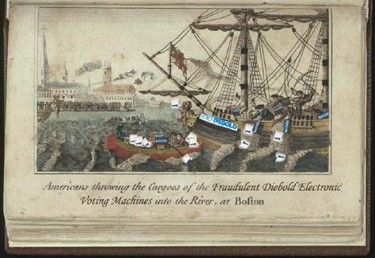Labelling and Localism: Local is the Political versus Supply Side Administration of Food

Mystery food is Orwellian-ly and totally misleadingly called "label conformity" in this corporate-biased piece of propoganda and legislation rolled into one. They are concerned that local people, wanting and gaining more knowledege about how to eat right might cut into the anonymous low grade montage of bilk they sell or pump into everyone. And they are right. The pink elephant in the room is in those little pink packets: the New Mexico state level laws and desires that are building to ban cheap sugar substitute of aspartame. This is a drawing of the battle lines between the interests of the consumer and how the interests of the corporation are totally at odds with it materially speaking, or in terms of knowledge about the materials.
Certainly like most Bush neocon legislation ("Healthy Forest"...Clearcutting bills; "Healthy Skies"...Coal Power Plant Expansions and Off-Regulation Bills, etc.; The fascist "Patriot Act", etc.) all show a use of Orwellian inversals.
However, we can indeed have label conformity--that is pro consumer, by allowing for uniform standards to appreciate locality in labeling. Including a great deal of information on the label can be the conforming standard. However, the supply side informally gatekept idea of "label conformity" really means corporate informal political clientelism and means consumer conformity and institutionalized ignorance.
And the larger that the food corporations get, the more they cut corners and food's interconnected nutritional and ecological soundness (with pesticides/herbicides used more and more in scaled agricultulre), and even economic soundness. The three issues of health, ecology, and economics really call these shallow corporate corporate ideas totally into question.
The labelling issues story is one that everyone should follow--how politics of labelling can be either in the benefit of the consumer, or in this bill, designed to engineer a forced repressive consumerism with less choices available and with more consumers in the (corporate) dark because they want to micromanage consumer behavior from central locations in distant offices, instead of listen to and respond to consumer behavior. Such corporate consumptive ignorance and ambivalance of the risks are at root in the short term bottom lines (nonplanning) of corporations.
This goes well with the points raised in the Supply Versus Demand article. It's what you might even call a textbook example of the supply versus demand principle, as scale expands the material and ideological (i.e., knowledge) interests of consumers and the interests of supply side organizations and actors completely diverge. Ideally, consumers should have access to all the information about their purchase they want. From the point of view of the supply-side ideal, consumers should all be force fed in complete ignorance and lack of choice to maintain the clientelism sitution desired of whatever the corporation wants to give them.
Ideally as mentioned in the proposals of Toward A Bioregional State:
Consumer rights shall always trump supply side rights of organizations and sellers when it comes to any of the issues of (a) basic knowledge about the commodity; (b) the capacity for discriminative choice from the point of view of the consumer which shall be maintained; (c) when it comes to issues of individual and public health, (d) of ecological interactive effects, and (e) of economic sustainability.
In issues of human health, ecological issues, and economic sustainability, the smaller jurisdictional level has more awareness, knowledge, and interest in these endeavors; therefore jurisdictional sovereignty of smaller jurisdiction over the larger state should be the uniform principle in these issues of material commodity regulation.
Congress Poised to Pass Bill Taking Away Right to Know What's in Your Food
Tell your Congressman or Congresswoman to vote "No" on House of Representatives Bill H.R. 4167, the "National Uniformity for Food Act"
The House of Representatives will vote this week on a controversial "national food uniformity" labeling law that will take away local government and states' power to require food safety food labels such as those required in California and other states on foods or beverages that are likely to cause cancer, birth defects, allergic reactions, or mercury poisoning. This bill would also prevent citizens in local municipalities and states from passing laws requiring that genetically engineered foods and ingredients such as Monsanto's recombinant Bovine Growth Hormone (rBGH) be labeled.
The House will vote March 2, 2006 on a bill that would gut state food safety and labeling laws. H.R. 4167, the "National Uniformity for Food Act," lowers the bar on food safety by overturning state food safety laws that are not "identical" to federal law. Hundreds of state laws and regulations are at risk, including those governing the safety of milk, fish, and shellfish. The bill is being pushed by large supermarket chains and food manufacturers, spearheaded by the powerful Grocery Manufacturers of America.
Big food corporations and the biotech industry understand that consumers are more and more concerned about food safety, genetic engineering, and chemical-intensive agriculture, and are reading labels more closely. They understand that pesticide and mercury residues and hazardous technologies such as genetic engineering and food irradiation will be rejected if there are truthful labels required on food products. Industry-sponsored H.R. 4167 is gaining momentum and must be stopped! Act now! Preserve local and regional democracy and protect yourself and your family from unsafe food by sending an email or calling your Representative and urging them to vote "No" on H.R. 4167.
Please Take Action Now--Send a Message to Your Congress Member in the House of Representatives to Vote "No" on H.R. 4167
http://www.organicconsumers.org/rd/labeling.cfm
And please call your Congress Member at 202-224-3121
Regards & Solidarity,
Ronnie Cummins,
Organic Consumers Association
Related News Headlines
2/25 - States right in food fight (Toledo Blade)
2/24 - State Leaders Take Charge (Wall Stree Journal)
2/18 - Feinstein-Boxer: Don't Preempt California Food Safety Laws(Ubanet/CA)
2/2 - Federal food label law would trump California's Prop. 65 (Scripps Howard News Service)
1/30 - "Food Labeling Uniformity" Bill Will Actually Eliminate Consumer Choice -- Act Now
1/16 - Corporate Food Giants & Congress Threaten States' Rights to Label Food
12/15 - House Republicans Move to Kill State Food Safety Labels
11/8 - Industry Pressing Congress to Outlaw States' Rights to Require Labels for GE Food
2.
Heroic NM Senator Fights Aspartame Machine
Dr. Betty Martini, D.Hum, Founder
Mission Possible International
2-19-2006
I had the pleasure of meeting with Senator Gerald Ortiz y Pino who sponsored the New Mexico Senate aspartame bill. No doubt the lobbyists with the morals of rapists preyed on his mind...and today he wrote this letter:
Aspartame Buys Time
By Senator Jerry Ortiz y Pino
2-19-2006
Nothing surprises me anymore when it comes to the corrosive influence of money on our public policy. I'm not just talking about the shenanigans inside the beltway of our nation's capitol-that Congress is for sale to the highest bidder has unfortunately become a practically accepted tenet of the American belief system.
So accepted is it that the astounding arrogance and venality being revealed by the current Tom Delay and Jack Abramoff scandals in the District of Columbia scarcely produce raised eyebrows, let alone outrage.
But I'm not just talking about that.
Nor am I talking only about the way that [centralized] moneyed interests are able to sway [and demote] local government toward policies that benefit those interests; hey, we apparently prefer a system in which local elections go to the highest bidder and business-as-usual involves twisting contractors' arms to secure campaign contributions.
Instead, today I'd like to zero-in on the pressure applied to our third level of representative government, the carryings-on that occur in the halls of State Government ... in all its branches.
And from among at least a dozen recent, painful examples of how big business manages to protect itself from such wet-blanket considerations as the good of the public, I'd like to select one as a representative: the continued approval of the reliance by processed food and beverage manufacturers on the chemical aspartame.
As an artificial sweetener, one now being added to some 6,000 products, it is difficult for most Americans to not consume aspartame daily. Its safety (and clearing up any doubts about that safety) would seem to be of critical importance to millions of us. But any discussion of this topic has been postponed in New Mexico indefinitely-through influence exerted by representatives hired by the Japanese manufacturer of aspartame, the Ajinomoto Corporation.
Those well-connected hired hands managed, in December, to frighten the State Environmental Improvement Board (EIB) into backing off of the public hearings into aspartame's safety that they had originally agreed to conduct this coming summer. They managed this delay by challenging the authority of the State of New Mexico to review anything already approved by the Federal Food and Drug Administration (FDA) and by threatening to sue the state if we tried to do so.
Then those same hired hands resurfaced (augmented by the addition to their team roster of Butch Maki, a close confidant of Gov. Bill Richardson) in time to quash all attempts to discuss the matter during the just-concluded State Legislature.
There was one hearing on the subject and it drew significant numbers of the industry lobbyists, all of whom asserted the same party line: The substance is perfectly safe; the Federal Government has looked at it carefully and who the heck is New Mexico, anyway, to raise any questions about it? [Because in issues of human health, ecological issues, and econmic sustainability issues and commodity heath the smaller state should be soverign over the larger.]
The committee succumbed, and turned down the measure to ban aspartame 7-2.
That half-hour hearing was the total discussion of the matter this year in the public arena in New Mexico, unless the EIB board changes its mind and decides to call Ajinomoto's bluff by going ahead and holding a hearing.
The incredible spectacle of corporate hirelings exerting this kind of influence is, to our great shame, all too common in our state. The Legislature has resisted reforming campaign finance laws to inject some real muscle, which leaves the door wide open to the corporate powers to throw money around strategically, buying whatever access they need or blocking their opposition's access to the policymakers.
But no one should be surprised that Ajinomoto would rely on muscle to protect its profits from aspartame. The entire history of this product's approval by the FDA is rife with muscle flexing ... and very little in the way of science. Originally, it was a patent of the Searle Pharmaceutical Company. And beginning in the late '60s, the FDA repeatedly turned down Searle's submissions for approval, the results of its testings leaving serious doubts in the minds of FDA scientists.
All of that changed in 1981 when Ronald Reagan took the presidency. He listened to the then head of Searle, Donald Rumsfeld, (yes, that Donald Rumsfeld) who bypassed the scientists and went straight to the new Reagan appointee at FDA. Within weeks, the scientists were overruled and aspartame was approved. Several FDA scientists resigned in protest. They even alleged that Searle had fabricated results in the testing submitted.
Twenty-five years later, the evidence is mounting that our growing incidence of brain tumors, organ cancers and neurological diseases has followed the introduction of so many artificially created additives and chemicals in our food. It's only a matter of time until even Ajinomoto's money won't be able to block the unavoidable link between these unnecessary products and our decline in health.
When that happens, as it finally did to tobacco and lead and other heavy metals found in gasoline, we will act. The sad thing is that thousands of deaths and ruined lives will occur between now and then.
One of the cruel ironies to aspartame is that it was supposed to create sugar-free soft drinks for the benefit of diabetics. Since its introduction, the incidence of diabetes has soared. Some critics link the two. What is clear is that it ain't helping.
With all that money and muscle behind it, aspartame has evaded its comeuppance for another year. But the final reckoning can only be postponed, not avoided.
End of the Senator's letter
Last month there was still another study: http://www.wnho.net/new_greek_aspartame_studies.htm Bottom line: Alzheimers
We are now taking aspartame brain tumor cases in New York and New Jersey for litigation, three year statute of limitations.
When I think of the Calorie Control Council sending out press releases trying to prevent the public from believing these studies, as they have done since the New York Times article, I think of the millions of babies murdered in their mother's womb as the CCC pushes this toxin on pregnant women. May they receive within themselves the recompense for their error, and may Jehovah God see to it, and add to it.
Dr. Betty Martini, D.Hum, Founder
Mission Possible International
9270 River Club Parkway
Duluth, Georgia 30097
770 242-2599
Doctors mentioned in this post can be seen in the documentary Sweet Misery: A Poisoned World. They are the heros of the anti-aspartame movement, continually publishing to rid the planet of this poison.
More information on aspartame on www.wnho.net and www.dorway.com (In memory of David Oliver Rietz who lost his life to aspartame)
Aspartame Toxicity Center, www.holisticmed.com/aspartame


